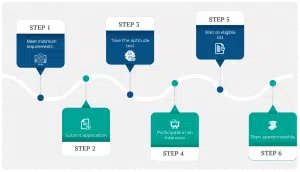Note:
the iPREP course prepares candidates for the CritiCall test used in both the US and Canada, covering essential modules like data entry, multi-tasking, decision-making, map reading, and memory recall.
Welcome, future test-taker, to the world of the CritiCall Test. This is a test that’s not just about what you know, but how you can apply it in real-world, high-pressure situations.
The CritiCall Test is a pre-employment assessment tool, specifically designed to evaluate the skills and abilities crucial for public safety dispatchers, including police, fire, and ambulance dispatchers. Here are some key facts about the test:
- Purpose: The test is designed to measure your ability to handle the multi-tasking, decision-making, and data-entry demands that are integral to a dispatcher’s job. It’s not about memorizing facts or figures, but about demonstrating your ability to perform under pressure.
- Skills Measured: The CritiCall Test assesses a wide range of skills, including data entry, multi-tasking, decision-making, map reading, and more. It’s designed to mimic the real-world tasks you’ll face in a dispatch role.
- Format: The test is computer-based and consists of several different sections, each designed to measure a different skill. You’ll face everything from data entry tasks to decision-making scenarios.
- Validity: The CritiCall Test is widely recognized as a valid assessment tool. It’s used by public safety agencies across the United States and has been proven to be a reliable predictor of job performance.
Remember, the CritiCall Test is not about what you know, but how you perform. It’s designed to mimic the challenges you’ll face in a real dispatch role, so it’s a great way to demonstrate your skills and readiness for the job.
Did you know?
The CritiCall Test, a comprehensive 2 to 3-hour assessment, is a trusted tool used by agencies in the United States and Canada to select competent candidates for dispatcher roles. With 11 to 15 sections tailored to evaluate specific skills, the test’s structure can vary based on the agency’s requirements.
With over 20 years of use, it’s employed by more than 1500 government and private entities in Canada alone, including 911 dispatchers, communications operators, and various police agencies. Whether you’re in the United States or Canada, the CritiCall Test is a recognized and reliable tool for dispatcher assessment.
CritiCall Question Types Explained
As you embark on your journey to conquer the CritiCall Test, it’s crucial to understand the different types of questions you’ll encounter. Each section of the test is designed to assess a specific skill set that’s vital for a dispatcher’s role. Let’s delve into these question types to give you a clear picture of what to expect:
- Decision-Making / Multi-Tasking: These questions assess your ability to quickly make accurate decisions while managing multiple tasks simultaneously. You might be asked to respond to simulated calls, deciding on the appropriate response while also handling other tasks. Success in this section requires strong attention to detail, quick thinking, and the ability to stay calm under pressure.
- Data Entry: This section tests your speed and accuracy in entering information into a system, similar to what you’d do as a dispatcher. You’ll need to demonstrate good typing skills and attention to detail to perform well in this section.
- Memory Recall: Here, your ability to remember and recall information is tested. You might be asked to remember details from a simulated call or other information. Good memory and attention to detail are key to succeeding in this section.
- Map Reading: This section assesses your ability to read and understand maps. You might be asked to determine the fastest route or locate specific addresses. Good spatial awareness and understanding of map symbols are crucial for this section.
- Prioritization: These questions test your ability to prioritize tasks based on their urgency and importance. You might be asked to rank calls or tasks in order of priority. This section requires good judgement and decision-making skills.
- Cross Referencing: This section tests your ability to cross-reference information from different sources quickly and accurately. You might be asked to match information or find discrepancies. Good attention to detail and the ability to process information quickly are important for this section.
- Probability: These questions assess your ability to estimate the likelihood of an event occurring based on the information provided. You might be asked to predict the probability of certain outcomes. This section requires good logical reasoning and analytical skills.
- Vocalization Summary / Call Summarization: This section tests your listening skills and your ability to accurately summarize information.
- Reading Comprehension: This section tests your ability to understand and interpret written information. You might be asked to read a passage and answer questions about it. Good reading skills and the ability to understand and analyze text are crucial for this section.
- Proofreading: These questions assess your ability to spot errors in written information. You might be asked to identify spelling, grammar, or punctuation errors. Good language skills and attention to detail are key for this section.
- Spelling: This section tests your spelling skills. You might be asked to spell words correctly or identify the correct spelling of a word. Good language skills are important for this section.
- Mathematics: These questions test your numerical skills. You might be asked to perform basic arithmetic or solve problems involving time, distance, or other numerical information. Good numerical skills and the ability to solve problems quickly and accurately are crucial for this section.
To provide a quick and easy reference for your CritiCall Test preparation, we’ve summarized the different types of questions you’ll encounter in the table below. This table outlines each question type and the skills they assess, offering a concise overview to guide your study efforts.
| Question Type | Skills Assessed |
|---|---|
| Decision-Making / Multi-Tasking | Quick decision-making, multi-tasking, attention to detail |
| Data Entry | Typing speed and accuracy, attention to detail |
| Memory Recall | Memory and attention to detail |
| Map Reading | Spatial awareness, understanding of map symbols |
| Prioritization | Judgement, decision-making |
| Vocalization Summary / Call Summarization | Listening skills, attention to detail, summarization |
| Cross Referencing | Attention to detail, quick information processing |
| Probability | Logical reasoning, analytical skills |
| Reading Comprehension | Reading skills, understanding and analyzing text |
| Proofreading | Language skills, attention to detail |
| Spelling | Language skills |
| Mathematics | Numerical skills, quick and accurate problem-solving |
As we wrap up this overview of the question types, remember that understanding these is your first step towards effective preparation. Each section is designed to assess a specific skill set, and success lies in your ability to demonstrate these skills under pressure. However, it’s important to note that because the modules in your test are picked by the agency you want to work for, not all tests will include all of these types of questions. Now, let’s dive deeper into each question type to give you a comprehensive understanding of what to expect. Your journey to acing the CritiCall Test continues!
Decision-Making / Multi-Tasking
This section is designed to assess your ability to make quick, accurate decisions while managing multiple tasks simultaneously – a skill that’s crucial for dispatchers who often have to juggle multiple calls and tasks at once.
Text-Format: In the text-format version of this section, you might be presented with a simulated scenario where you have to manage multiple tasks at once. For example, you might have to respond to incoming calls, dispatch units, and keep track of the status of different units, all while making decisions based on the information you’re given. You’ll need to demonstrate your ability to prioritize tasks, make decisions quickly, and keep track of multiple pieces of information.
Audio-Format: In the audio-format version, you’ll listen to simulated calls and have to make decisions based on the information you hear. You might have to decide which units to dispatch based on the information from the call, or prioritize multiple incoming calls. Just like in the text-format version, you’ll need to demonstrate your ability to make decisions quickly, prioritize tasks, and manage multiple pieces of information.
In both formats, the key to success is staying calm under pressure, making decisions quickly but accurately, and keeping track of multiple pieces of information. It’s a challenging section, but with practice, you can develop the skills needed to excel.
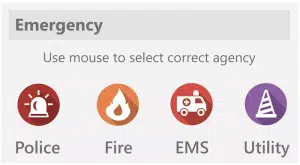
Decision-Making Sample Question
EMERGENCY – EMERGENCY – EMERGENCY
Using the “Decision-Making Rules,” select the most appropriate agency to respond to the following emergency scenario.
A vehicle swerved off the road. The driver is having difficulty breathing.

The correct answer is EMS.
Emergency Medical Service should be dispatched when there is an emergency medical condition requiring intervention.
Data Entry
The Data Entry section of the CritiCall Test is designed to assess your speed and accuracy in entering information into a system, a task that’s integral to a dispatcher’s role.
Text-Format: In the text-format version of this section, you might be presented with information that you need to enter into a simulated system. This could include details from a call, such as a caller’s name, address, and the nature of their emergency. You’ll need to demonstrate your ability to type quickly and accurately, ensuring that all information is entered correctly.
Audio-Format: In the audio-format version, you’ll listen to a simulated call and have to enter the information you hear into a system. This could include the same types of details as the text-format version, such as a caller’s name, address, and the nature of their emergency. Just like in the text-format version, you’ll need to demonstrate your ability to type quickly and accurately, ensuring that all information is entered correctly.
In both formats, the key to success is having strong typing skills and a keen attention to detail. It’s important to enter all information accurately, as mistakes could lead to serious consequences in a real dispatch scenario. Practice your typing skills and aim for both speed and accuracy to excel in this section.
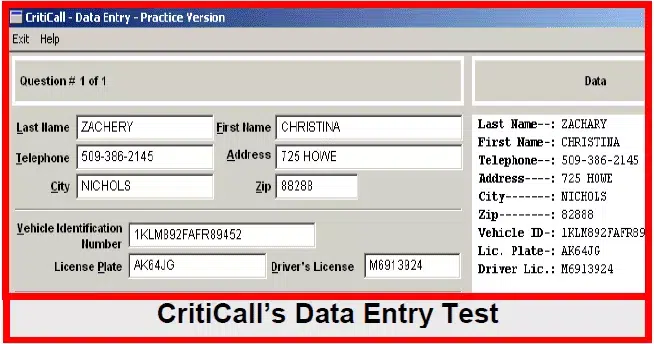
Data-Entry Sample Question
You will hear various pieces of information such as names and phone numbers.
Enter the information in the correct data entry box using ALL CAPS.
The order that you are given the information may not correspond with the order that the boxes are presented.
You can move between the data boxes using either the mouse or the TAB button. TAB will move the cursor forward one box, while Shift+TAB will move backward one box.
| Last Name |
| . |
| First Name |
| . |
| Phone Number |
| . |
| Address |
| . |
| City |
| . |
| Zip / Postal |
| . |
| Vehicle ID Number |
| . |
| License Plate |
| . |
| Driver’s License |
The Complete Form
| . |
| YANG |
| Last Name |
| . |
| STEVEN |
| First Name |
| . |
| 5239721996 |
| Phone Number |
| . |
| 3910 HISTORIC |
| Address |
| . |
| RIDGELINE |
| City |
| . |
| 70684 |
| Zip / Postal |
| . |
| BREG90136480A679 |
| Vehicle ID Number |
| . |
| W79VET |
| License Plate |
| . |
| XL060254 |
| Driver’s License |
Memory Recall
The Memory Recall section of the CritiCall Test is designed to assess your ability to remember and recall information, a vital skill for dispatchers who need to keep track of multiple pieces of information.
Text-Format: In the text-format version of this section, you might be presented with a simulated scenario or a piece of text and then asked to recall specific details. For example, you might need to remember the details of a simulated call, such as the caller’s name, address, and the nature of their emergency, and then answer questions about these details.
Audio-Format: In the audio-format version, you’ll listen to a simulated call and then be asked to recall specific details from the call. Just like in the text-format version, you might need to remember details such as the caller’s name, address, and the nature of their emergency, and then answer questions about these details.
In both formats, the key to success is having a good memory and attention to detail. It’s important to focus on the key details and remember as much as possible. Practice your memory skills and aim to recall information accurately to excel in this section.
Memory Sample Question
Enter the string to the field below only when the instruction “Type Now” appears
Type Here:
The string was 3RHU718.
Map Reading
The Map Reading section of the CritiCall Test is designed to assess your ability to read and understand maps, a crucial skill for dispatchers who need to guide units to specific locations.
Text-Format: In the text-format version of this section, you might be presented with a map and then asked to answer questions based on it. For example, you might need to determine the fastest route from one location to another, locate specific addresses, or identify landmarks. You’ll need to demonstrate your ability to understand map symbols, scale, and directions.
Audio-Format: In the audio-format version, you’ll listen to a simulated call describing a location or a route, and then you’ll need to use a map to answer questions about it. Just like in the text-format version, you might need to determine routes, locate addresses, or identify landmarks based on the information you hear.
In both formats, the key to success is having a good understanding of map symbols and directions, and being able to quickly and accurately interpret the information on the map. Practice your map reading skills and familiarize yourself with common map symbols to excel in this section.
Map Reading Sample Question
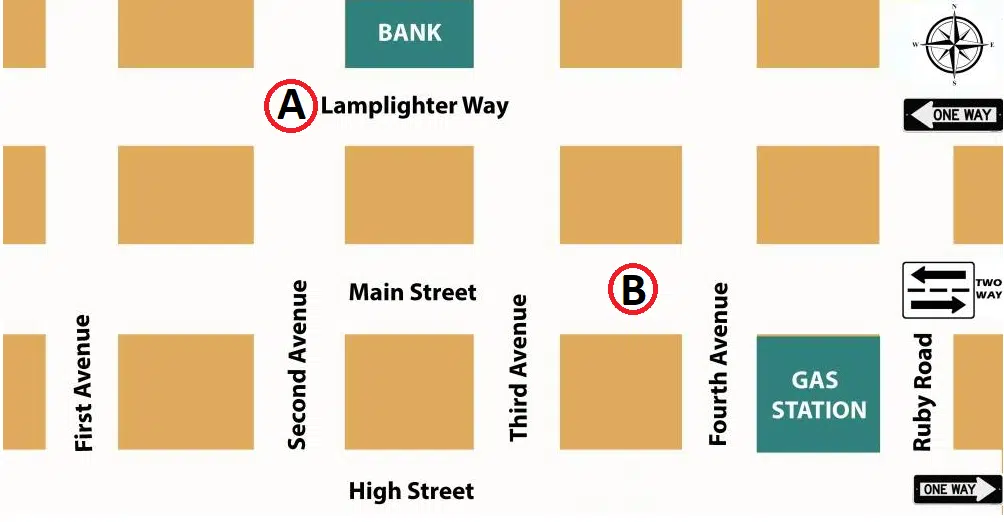
In order for unit A to reach unit B it can drive in the following directions:
- south and then west
- north and then east
- north and then west
- south and then east
The correct answer is south and then east.
Unit A first travels south on Second Avenue and then east on Main Street.
Prioritization
The Prioritization section of the CritiCall Test is designed to assess your ability to prioritize tasks based on their urgency and importance, a key skill for dispatchers who often have to juggle multiple calls and tasks at once.
Text-Format: In the text-format version of this section, you might be presented with a list of tasks or calls and asked to rank them in order of priority. For example, you might need to decide which of several incoming calls should be handled first based on the information provided.
Audio-Format: In the audio-format version, you’ll listen to a series of simulated calls and then be asked to prioritize them. Just like in the text-format version, you’ll need to decide which calls should be handled first based on the information you hear.
In both formats, you’ll need to use your judgment to determine which tasks are most urgent and important. This section tests your ability to make critical decisions under pressure, a skill that’s vital for success in a dispatcher role.
Prioritization Sample Question
Using the “Prioritization Rules,” choose the most appropriate priority for the given situation.
Report that family has returned from a vacation to find their home was robbed.
- Priority 1: An immediate threat to life or health
- Priority 2: An immediate threat to property
- Priority 3: A routine report or incident
- Priority 4: A public service or public education
The correct answer is Priority 3.
The incident has already occurred and no longer presents an immediate threat.
This is based on the four levels of priority:
Priority 1: An immediate threat to life or health – Incidents that are both in-progress and threaten a person’s well-being.
Priority 2: An immediate threat to property – Incidents that are in-progress but are related to theft/damage of things. There will be no element of potential human injury in these calls.
Priority 3: A routine report or incident – Calls for service that have previously occurred. The timeline for reporting these events may span anywhere from 10 minutes to 10 days. These calls are no longer in-progress and there is some type of time-lapse.
Priority 4: A public service or public education – These are calls not related to law enforcement incidents. They will relate to public services such as visiting schools to make presentations, checking on the safety of a newly constructed traffic barrier, marching in a parade, etc.
Vocalization Summary / Call Summarization
The Vocalization Summary or Call Summarization section of the CritiCall Test is designed to assess your listening skills and your ability to accurately summarize information. This is a crucial skill for dispatchers who need to listen to incoming calls, understand the key details, and relay this information accurately to emergency responders.
In this section, you’ll listen to a simulated call and then be asked to summarize the key details. This could involve identifying the nature of the emergency, the location, the caller’s identity, and any other relevant details. You might be asked to write out your summary or to select the correct summary from a list of options.
For example, you might listen to a call where a person reports a fire at a specific address and provides details about the size of the fire and the presence of people in the building. You would then need to summarize this information accurately, focusing on the key details that would be important for emergency responders.
This section tests your listening skills, your attention to detail, and your ability to understand and summarize information. Success in this section demonstrates your ability to accurately relay information, a skill that’s vital for success in a dispatcher role. Regular practice of active listening and summarization can help improve your skills in this area.
Call Summarization Sample Question
Listen to the following emergency call. Make ample notes on any information you find pertinent to the call.
After the call is complete, use your notes to answer the multiple-choice questions that follow.
For optimal practice, listen to the recording only once.
What is the number 8166399341?
- John Fraser’s Social Security number
- John Fraser’s phone number
- The VIN number of John’s car
- The VIN number of the car that hit John
John Fraser reported that he was hit by a Dodge RAM, VIN:8166399341
Cross Referencing
The Cross Referencing section of the CritiCall Test is designed to assess your ability to cross-reference information from different sources quickly and accurately. This is a vital skill for dispatchers who often need to verify information from multiple sources.
Text-Format: In the text-format version of this section, you might be presented with information from multiple sources and asked to match or compare them. For example, you might need to match a caller’s information with records in a database, or find discrepancies between two sets of information.
Audio-Format: In the audio-format version, you’ll listen to a series of simulated calls and then be asked to cross-reference the information you hear with information presented visually. Just like in the text-format version, you might need to match information or find discrepancies.
In both formats, you’ll need to demonstrate your attention to detail and your ability to process information quickly and accurately. This section tests your ability to handle complex information, a skill that’s vital for success in a dispatcher role.
Cross-Referencing Sample Question
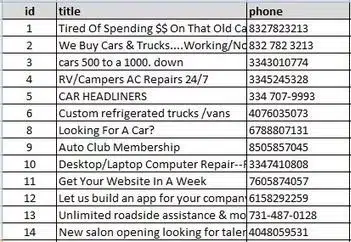
Your camper is stuck and needs roadside assistance. Which number should you call?
- 3345245328
- 7314870128
- 3347079993
- 6788807131
The correct answer is 7314870128, which is listed as 731-487-0128.
It is the number of “unlimited roadside assistance…”
Notice that the number 3345245328 is for a service that repairs campers’ AC (air conditioner) and not for roadside assistance.
Probability Determination
The Probability Determination section of the CritiCall Test (or Frequency of Information) is designed to assess your ability to estimate the likelihood of an event occurring based on the information provided. This is a key skill for dispatchers who often need to make predictions based on limited information.
Text-Format: In the text-format version of this section, you might be presented with a scenario and asked to estimate the probability of a certain outcome. For example, you might need to predict the likelihood of a certain type of emergency based on a caller’s symptoms or the details of a situation.
Audio-Format: In the audio-format version, you’ll listen to a simulated call and then be asked to estimate the probability of a certain outcome based on the information you hear. Just like in the text-format version, you might need to make predictions based on the details provided in the call.
In both formats, you’ll need to demonstrate your logical reasoning and analytical skills. This section tests your ability to make educated guesses based on the information at hand, a skill that’s vital for success in a dispatcher role.
Probability Determination Sample Question
Choose the most probable answer according to the witnesses’ statements.
Statement 1: “I saw the yellow truck run into the red car. He ran right through the stop sign, full tilt, and smashed into the truck. I didn’t get a look at the driver of the red car but there was a young guy driving the truck. He’s a white guy, I don’t know, maybe 20? He was probably texting or drinking or something.
Statement 2: “I’m calling about a car accident. A vehicle drove through a red traffic light and t-boned a Honda Civic. The Honda Civic is red, license plate L356J2. There were 2 people in the Civic, a female driver and a male passenger. They both look to be in their 80s. They are out walking around and seem uninjured. The driver of the other vehicle is out too. He also looks about 80 years old and seems uninjured.
Statement 3: “There’s been an accident. A yellow Dodge Ram pick up truck ran a stop sign and hit an orange car. Everyone’s out of the vehicles and walking around. They seem fine. The guy who ran the stop sign looks like he’s about 20. The couple from the other car is an elderly man and woman. The license plate of the orange car is L356JK. The license plate of the truck is L356J1.
The vehicle that caused the accident was a:
- Orange car
- Red car
- Red Honda Civic
- Yellow pick-up truck
- Yellow Honda Civic
The correct answer is Yellow pick-up truck.
The statements refer to this detail as follows:
Statement 1: “I saw the yellow truck run into…”
Statement 2: This statement does not mention this.
Statement 3: “A yellow Dodge Ram pick up truck ran a stop sign…”
Since two statements out of three refer to a yellow truck, this is the most probable answer.
Reading Comprehension
The Reading Comprehension section of the CritiCall Test is designed to assess your ability to understand and interpret written information. This is a crucial skill for dispatchers who often need to read and understand various types of documents and written instructions.
In this section, you’ll be presented with a passage or a document and asked to answer questions about it. For example, you might need to identify the main idea of a passage, draw conclusions, or interpret instructions.
This section tests your reading skills and your ability to understand and analyze text. Success in this section demonstrates your ability to comprehend and interpret written information, a skill that’s vital for success in a dispatcher role.
Reading Comprehension Sample Question
Performing CPR on patients with a Laryngectomy or Tracheostomy can add an additional challenge. Communicators should understand the following definitions and directions.
Laryngectomy – Patients who have had a laryngectomy (the surgical removal of all or part of the larynx) have a permanent opening at the base of their neck called a stoma, which connects the airway (trachea) to the skin of the neck. Patients with a complete laryngectomy will have no airflow from the mouth and nose.
Partial Laryngectomy – In patients with a partial laryngectomy, there can be some airflow from the nose and mouth, and the chest will not rise during ventilation. The caller must cover the patient’s nose and mouth with one hand.
Tracheostomy – An artificial opening into the trachea through the neck. There can be some airflow from the nose and mouth in these patients and the chest will not rise during ventilation unless the caller covers the patient’s nose and mouth with one hand.
For all of the above, the method of ventilation is to perform direct mouth-to-stoma ventilations. Do not instruct the caller to tilt the patient’s head back. Instead, keep the head straight while delivering two breaths of air.
Patients who have had a full laryngectomy will have what type of airflow to the nose and mouth?
- Good airflow
- Poor airflow
- Partial airflow
- No airflow
The correct answer is No airflow.
The section in the text that supports that is: “Patients who have had a laryngectomy (the surgical removal of all or part of the larynx) have a permanent opening at the base of their neck called a stoma, which connects the airway (trachea) to the skin of the neck. Patients with a complete laryngectomy will have no airflow from the mouth and nose.”
Proofreading
The Proofreading section of the CritiCall Test is designed to assess your ability to spot errors in written information. This is a key skill for dispatchers who often need to ensure that the information they’re working with is accurate.
In this section, you’ll be presented with a passage or a document and asked to identify any errors. These could be spelling, grammar, or punctuation errors, or inconsistencies in the information presented.
This section tests your attention to detail and your language skills. Success in this section demonstrates your ability to ensure the accuracy of written information, a skill that’s vital for success in a dispatcher role.
Proofreading Sample Question
There is one error in the sentence.
Identify the error and write the correct form of the word.
If you find incorrect punctuation, write the preceding word and the correct punctuation mark.
Sentence:
It certainly wasn’t the affect they were aiming for.
Type the correct word here:The correct phrasing is:
It certainly wasn’t the effect they were aiming for.
When using the word “effect” as a noun use “effect.” Reserve “affect” to be used as a verb.
Spelling
The Spelling section of the CritiCall Test is designed to assess your spelling skills, a fundamental aspect of written communication. Accurate spelling is crucial for dispatchers, as they often need to record information such as names, addresses, and descriptions of incidents, where a single misspelled word could lead to confusion or miscommunication.
In this section, you might encounter a few different types of questions:
- Straightforward Spelling Test: You might be presented with a word like “emergency” and asked to spell it correctly. This tests your ability to recall and accurately reproduce the spelling of common (and sometimes uncommon) words.
- Identifying Correctly Spelled Words: You might be given a list of similar spellings like “recieve”, “recive”, “receive”, and asked to identify the correct spelling. This tests your attention to detail and your familiarity with common spelling patterns and rules.
- Correcting Misspelled Words: You might be given a sentence like “The patiant was taken to the hospitol” and asked to correct the misspelled words. This not only tests your spelling skills, but also your proofreading skills and your ability to spot errors in context.
In all these formats, the key to success is a strong grasp of spelling rules and patterns, a good memory for the spelling of specific words, and careful attention to detail. Regular practice and reading can help improve your spelling skills, and using spell-check tools can help you spot and learn from your mistakes. Remember, every word counts in a dispatcher’s role, and accurate spelling can make a big difference.
Spelling Sample Question
Listen to the word spoken in the sentence.
Immediately enter the word in the text field.
For optimal practice, play the audio clip only once.
There were two holsters for tasers and firearms.
The complete sentence is:
There were two separate holsters for tasers and firearms.
Mathematics
The Mathematics section of the CritiCall Test is designed to assess your numerical skills, a fundamental aspect of a dispatcher’s role. Dispatchers often need to perform quick calculations related to distances, times, resources, or even probabilities, and thus, a solid understanding of basic arithmetic and problem-solving skills is crucial.
In this section, you might encounter a few different types of questions:
- Basic Arithmetic: You might be presented with straightforward arithmetic problems involving addition, subtraction, multiplication, or division. For example, you might be asked to calculate the total number of units needed if each incident requires three units and there are four incidents.
- Time, Speed, and Distance Problems: You might be asked to solve problems involving time, speed, and distance, which are common calculations in dispatch scenarios. For example, if a patrol car is 12 miles away from an incident and can travel at a speed of 60 miles per hour, you might be asked to calculate how long it will take for the patrol car to reach the incident.
- Resource Allocation: You might be given a problem where you need to calculate the allocation of resources based on certain constraints. For example, if each unit can handle two tasks and there are ten tasks that need to be handled, you might be asked to calculate how many units are needed.
- Probability and Estimation: In some cases, you might be asked to estimate the likelihood of an event or make predictions based on numerical information. For example, if certain types of incidents have been known to occur with a certain frequency, you might be asked to estimate the probability of such an incident occurring during a given time period.
In all these types of questions, the key to success is a solid understanding of basic arithmetic and problem-solving skills, as well as the ability to apply these skills to practical, real-world scenarios. Regular practice of these skills can help improve your speed and accuracy, and using resources like math workbooks or online problem sets can provide valuable practice. Remember, every second counts in a dispatcher’s role, and being able to perform quick, accurate calculations can make a big difference.
Mathematics Sample Question
In yesterday’s incident, a firetruck was spraying water for 15 minutes at a rate of half a gallon per second. How many gallons did the firetruck spray?
- 450 gallons
- 750 gallons
- 300 gallons
- 900 gallons
The correct answer is 450 gallons.
15 minutes = 15 x 60 seconds = 900 seconds.
Rate of half a gallon per second x 900 seconds = 900/2 = 450.
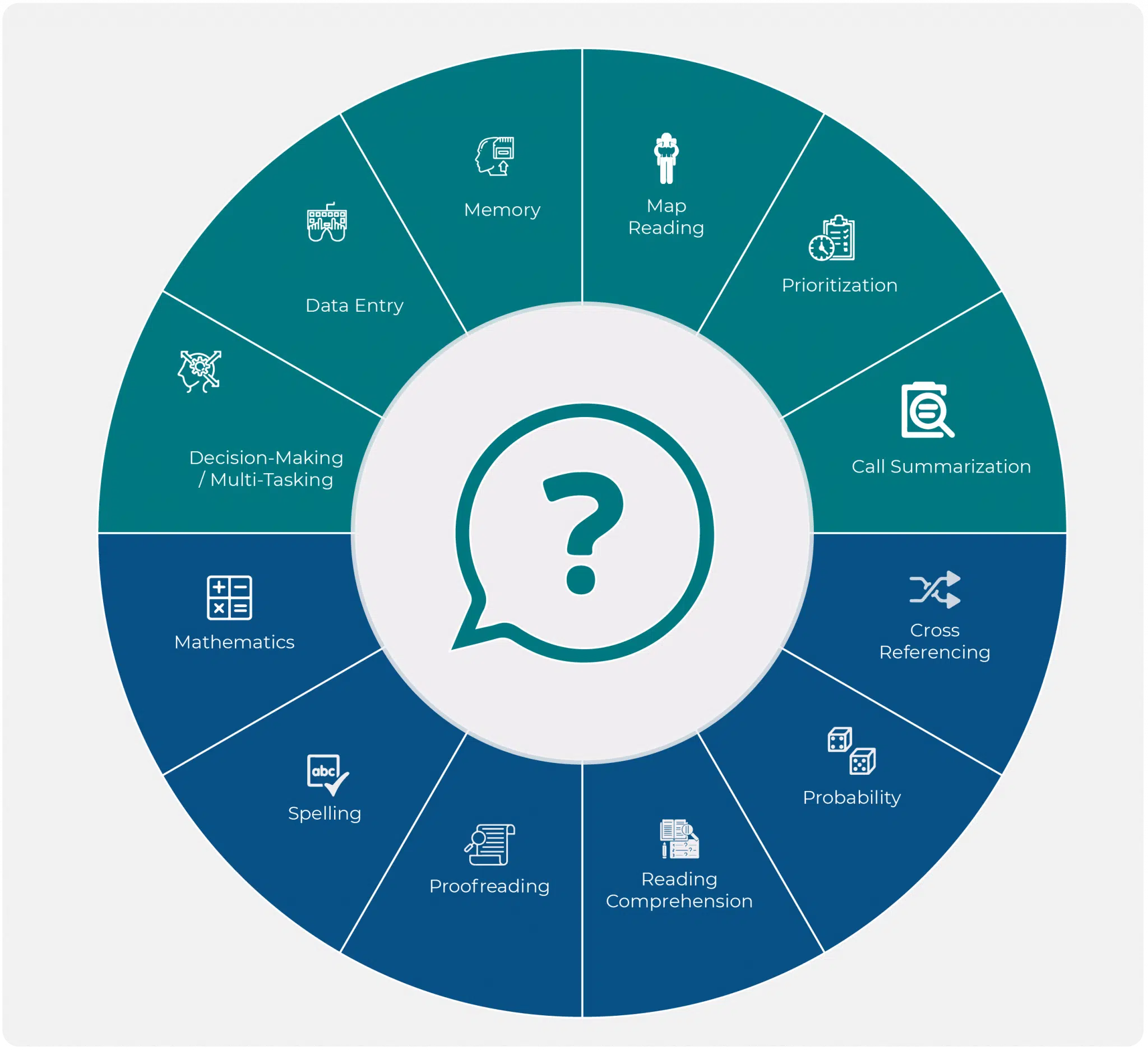
CritiCall Preparation Strategies
Embarking on your journey to conquer the CritiCall Test requires a solid preparation strategy. The test is designed to assess the skills vital for a dispatcher’s role, and preparing effectively can help you demonstrate these skills confidently. Here are some strategies that can guide your preparation:
- Understand the Test Format: Familiarize yourself with the structure of the test, the types of questions you’ll encounter, and the skills each section assesses. This understanding is your first step towards effective preparation.
- Practice Active Listening: As many sections of the test involve audio clips, honing your active listening skills is crucial. Practice listening to audio clips, summarizing the information, and recalling key details.
- Improve Typing Speed and Accuracy: The Data Entry section assesses your typing skills, so it’s important to practice typing quickly and accurately. There are many online tools available that can help you improve your typing skills.
- Hone Your Memory Skills: The Memory Recall section tests your ability to remember and recall information. Practice memory games or exercises to improve your memory skills.
- Read Regularly: The Reading Comprehension, Proofreading, and Spelling sections all assess different aspects of your reading and language skills. Regular reading can help improve these skills.
- Practice Map Reading: If you’re not familiar with reading maps, now is the time to start. Understanding map symbols and directions is crucial for the Map Reading section.
- Brush Up on Basic Arithmetic: The Mathematics section involves basic arithmetic and problem-solving. Regular practice of these skills can help improve your speed and accuracy.
- Simulate Test Conditions: Practice under conditions that mimic the real test. This can help you get used to the pressure and manage your time effectively.
- Take Care of Your Health: Regular exercise, a healthy diet, and adequate sleep can all contribute to better concentration and performance.
In closing, preparing for the CritiCall Test is a journey that requires dedication, practice, and a solid strategy. But remember, every step you take in preparation brings you closer to your goal. Use these strategies as a guide, but also listen to your own needs and adjust your preparation accordingly. You have the skills and the potential to excel in the CritiCall Test, and with the right preparation, you can turn that potential into success.
“The CritiCall test is very difficult, but it is possible to pass it with preparation. There are a number of resources available to help you prepare for the test, including practice tests and study guides. If you are serious about becoming a police officer, I highly recommend that you prepare for the CritiCall test.”
Source: reddit user
Test Features
Purpose of the Test
The primary purpose of the CritiCall Test is to assess the skills and abilities that are essential for a role in public safety dispatch. The test is designed to mimic the tasks and challenges that a dispatcher faces, making it a realistic and valid assessment of a candidate’s suitability for the role. It measures a range of skills including decision-making, multi-tasking, data entry, memory recall, map reading, and more.
Realistic Job Preview
One of the key features of the CritiCall Test is that it provides a realistic job preview. The test is designed to mimic the tasks and challenges that a dispatcher faces, from handling multiple calls simultaneously to making quick decisions under pressure. This not only helps agencies assess a candidate’s suitability for the role, but also gives candidates a glimpse into what the job entails.
Variety of Question Types
The CritiCall Test includes a variety of question types, each designed to assess a specific skill. This includes decision-making and multi-tasking questions, data entry tasks, memory recall exercises, map reading tasks, and more. The variety of question types ensures a comprehensive assessment of a candidate’s skills.
Audio and Text-Based Questions
The CritiCall Test includes both audio and text-based questions. This reflects the nature of a dispatcher’s role, which involves both listening to calls and reading information. The inclusion of audio questions also allows the test to assess a candidate’s active listening skills and their ability to understand and recall spoken information.
Adaptability to Agency Needs
Another key feature of the CritiCall Test is its adaptability to the needs of individual agencies. Agencies can choose from a range of modules to include in their version of the test, allowing them to focus on the skills that are most relevant to their specific needs. This means that while the core skills assessed by the CritiCall Test are consistent, the specific content of the test can vary between agencies.
Designed for No Prior Experience
The CritiCall Test is designed so that candidates do not need prior experience in dispatch or familiarity with dispatching software to perform well. The test measures underlying skills and abilities, rather than knowledge or experience. This makes the test fair and accessible to all candidates, regardless of their background.
Common Names of the CritiCall Test
The CritiCall Test is also commonly known by the following names:
- Public Safety Dispatcher/Calltaker Pre-Employment Testing System
- Dispatcher Test
- 911 Dispatcher Test
- Emergency Dispatcher Test
- Public Safety Communications Pre-Employment Test
- CritiCall Dispatcher Test
“The CritiCall test is a very different experience from any other test I’ve ever taken. It’s not just about knowing the rules or being able to make quick decisions – it’s also about being able to stay calm and focused under pressure. The test is very fast-paced, and there’s a lot of information to process. If you’re not used to working under pressure, it can be very overwhelming.”
Source: A reddit user
Technical Facts
Fast Facts (tl;dr)
- Computer-based test.
- Duration: 2 to 3 hours.
- Includes 11 to 15 sections.
- Both audio and text-based questions.
- Scored based on correct responses.
- Passing score typically around 70%.
- Retake policies vary by agency.
- No penalty for incorrect answers.
- In use for over 20 years.
- Used by agencies across the U.S. and Canada.
Test Duration
The CritiCall Test typically takes between 2 to 3 hours to complete. However, the exact duration can vary depending on the number of modules included in the test and the specific rules of the administering agency.
Number of Sections
The CritiCall Test includes between 11 to 15 sections, depending on the agency. Each section is designed to assess a specific skill, such as decision-making, data entry, memory recall, map reading, and more.
Test Format
The CritiCall Test is a computer-based test. It includes both audio and text-based questions, reflecting the variety of tasks a dispatcher needs to handle. The test is designed to be user-friendly and does not require prior computer experience.
Scoring
The CritiCall Test is scored based on the number of correct responses. Each section of the test is scored separately, and there is no penalty for incorrect answers. The passing score varies between agencies, but it is typically around 70%.
Retake Policy
The retake policy for the CritiCall Test varies between agencies. Some agencies allow candidates to retake the test after a certain period of time if they do not pass on their first attempt, while others may limit the number of retakes.
Test Preparation
While the CritiCall Test is designed to assess underlying skills rather than knowledge or experience, preparation can still be beneficial. Familiarizing yourself with the test format, practicing relevant skills, and taking care of your physical and mental health can all contribute to better performance on the test.
Validity and Reliability
The CritiCall Test has been in use for over 20 years and has been validated through extensive research. It is a reliable tool for assessing a candidate’s suitability for a dispatcher role and is used by agencies across the United States and Canada.
Results Scale and Interpretations
Did you know?
It’s important to note that in most cases, agencies require a passing score in each individual section, not just an overall passing score. This underscores the importance of familiarizing yourself with the test format before taking the test.
Understanding how your CritiCall Test results are scored and interpreted is crucial to assessing your performance and identifying areas for improvement. The score report provides a comprehensive overview of your performance across different sections of the test, each assessing a specific skill set. Let’s delve into the different components of the score report and what they mean:
Raw Score: The raw score is the most straightforward component of your score report. It represents the total number of questions you answered correctly on the test. For example, if the test has 100 questions and you answered 85 correctly, your raw score would be 85.
Percentile Ranking: Your percentile ranking compares your performance to that of other test-takers. If your percentile rank is 70, for example, it means you scored higher than 70% of the test-takers. This gives you a sense of how you performed relative to others.
Sub-Scores: The CritiCall Test assesses a range of skills, and your score report will provide sub-scores for each section of the test. These sub-scores allow you to see how you performed in each skill area, helping you identify your strengths and areas for improvement.
Score Range: The score range provides a context for understanding your raw score. It shows the lowest and highest possible scores for the test. For example, if the test has 100 questions, the score range would be 0 to 100.
Passing Score: The passing score is the minimum score you need to achieve to pass the test. This can vary between agencies, but it’s typically around 70% of the total score.
For example, let’s say you took a CritiCall Test with 100 questions. If you answered 85 questions correctly, your raw score would be 85. If this score is higher than what 70% of the test-takers achieved, your percentile rank would be 70. If the passing score set by the agency is 70, you would have passed the test. Your score report would also provide sub-scores for each section of the test, allowing you to see how you performed in each skill area.
Passing Scores
Based on our research, many agencies require passing scores in the following ranges. Please be aware that some agencies may require higher passing scores.
Attention to Detail
| Section | Passing Score |
|---|---|
| Data entry with multi-tasking | 55-60 keystrokes per minute |
| Audio data entry with multi-tasking | 28-40 keystrokes per minute |
| Keyboarding | 35 words per minute |
| Cross-referencing | 56%-70% |
| Character comparison | 70% |
Dispatcher Skills
| Section | Passing Score |
|---|---|
| Prioritization | 70% |
| Memory recall | 61%-70% |
| Map reading | 62%-70% |
Basic Skills
| Section | Passing Score |
|---|---|
| Call summarization | 57%-70% |
| Reading comprehension | 57%-60% |
| Spelling and sentence clarity | 68%-70% |
| Math | 70% |
In closing, understanding your CritiCall Test score report is an important part of your test preparation and career journey. It provides a comprehensive overview of your skills and abilities, helping you understand where you stand and what you need to work on. Remember, the goal is not just to pass the test, but to develop the skills and abilities that will make you an effective dispatcher. So, use your score report as a tool for growth and development, and keep striving to improve.
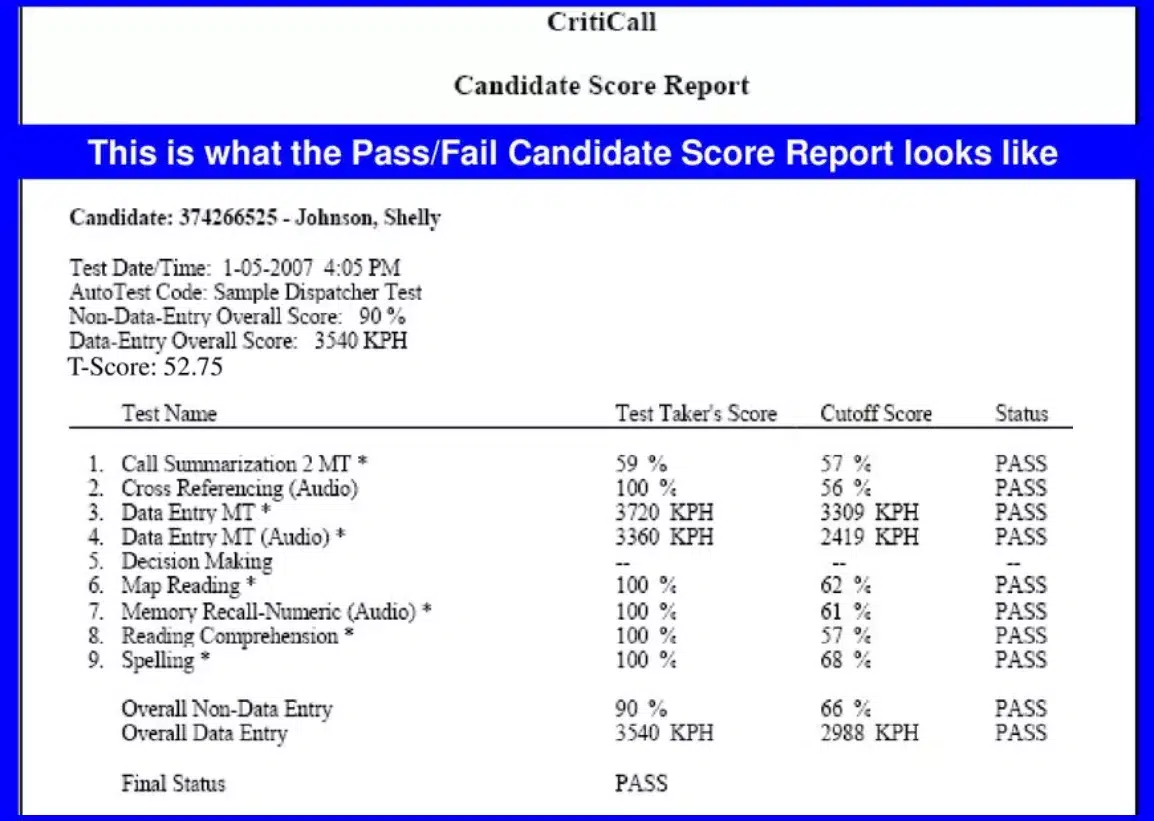
iPREP: Concise. Focused. What you need.
Sign up
Immediate access
Practice
Online self-paced
Pass
Ace that Test!
CritiCall FAQs
The CritiCall Test is a pre-employment test used by public safety agencies to assess the skills and abilities of candidates applying for dispatcher roles. It measures a range of skills including decision-making, multi-tasking, data entry, memory recall, map reading, and more.
The CritiCall Test typically takes between 2 to 3 hours to complete. However, the exact duration can vary depending on the number of modules included in the test and the specific rules of the administering agency.
The CritiCall Test measures a range of skills that are essential for a dispatcher’s role. These include decision-making, multi-tasking, data entry, memory recall, map reading, cross-referencing, probability estimation, reading comprehension, proofreading, spelling, and mathematics.
The CritiCall Test is scored based on the number of correct responses. Each section of the test is scored separately, and there is no penalty for incorrect answers. The passing score varies between agencies, but it is typically around 70%.
The retake policy for the CritiCall Test varies between agencies. Some agencies allow candidates to retake the test after a certain period of time if they do not pass on their first attempt, while others may limit the number of retakes.
No, the CritiCall Test is designed to assess underlying skills and abilities, rather than knowledge or experience. You do not need prior experience in dispatch or familiarity with dispatching software to perform well on the test.
Preparing for the CritiCall Test involves understanding the test format, practicing relevant skills, and taking care of your physical and mental health. It’s also beneficial to practice under conditions that mimic the real test.
The CritiCall Test is used by public safety agencies as part of the selection process for dispatcher roles. It helps agencies assess a candidate’s suitability for the role and provides a realistic preview of the tasks a dispatcher needs to handle.
Yes, the CritiCall Test is used by agencies in both the United States and Canada.
After you take the CritiCall Test, your results will be scored and you will receive a score report. This report provides a comprehensive overview of your performance and can be used to assess your suitability for a dispatcher role. If you pass the test, you may proceed to the next stage of the selection process, which varies between agencies.
CritiCall Test Tips
- Arrive Early: Make sure to arrive at the test center early. This will give you time to relax, familiarize yourself with the environment, and avoid any last-minute stress.
- Read Instructions Carefully: Each section of the CritiCall Test has specific instructions. Make sure to read these carefully before you start each section to ensure you understand what is expected.
- Manage Your Time Wisely: The CritiCall Test is timed, so it’s important to keep an eye on the clock. Try to distribute your time evenly across the questions and avoid spending too much time on any one question.
- Stay Calm: The test is designed to mimic the pressure of a dispatcher’s role, but it’s important to stay calm. If you find yourself getting stressed, take a moment to breathe and refocus.
- Trust Your Instincts: If you’re unsure about a question, trust your instincts. Your first response is often the correct one.
- Use the Process of Elimination: If you’re unsure about a question, try to eliminate the incorrect answers. This can often make it easier to identify the correct answer.
- Review Your Answers: If you have time at the end of the test, review your answers. Make sure you haven’t missed any questions and that you’re happy with your responses.
Remember, the CritiCall Test is a measure of your skills and abilities, not your worth as a person. Do your best, stay positive, and remember that every test is a learning experience.
“Practice TAB SHIFT. It is worth it to purchase a training program so you can see how the test is set up… Make sure you get answer ALL the “pop up” questions. You have 15 seconds to read and answer either police/fire/EMS/utility. Those have big points… Remind yourself that 15 seconds is a long time. So if you are in the middle of entering a vin #, finish, then immediately and quickly answer the pop up question… If you are able to invest in an online program to practice criticall, it’s worth it. TAB/Shift will allow you to go up and down In data entry portions faster than a mouse.”
Source: Single_Ad1878/reddit
Administration
- Test Location: The CritiCall Test is typically administered at a testing center designated by the hiring agency. In some cases, it may be administered online.
- Test Schedule: The test schedule is determined by the hiring agency. Candidates are usually informed of the date and time of the test after their application has been reviewed.
- Test Format: The CritiCall Test is a computer-based test. It includes a variety of question types, both multiple-choice and performance-based tasks.
- Test Materials: All necessary materials, including headphones for the audio portions of the test, are provided at the test center. Personal items, including pens and paper, are typically not allowed.
- Cost: The cost of the CritiCall Test varies and is usually covered by the hiring agency. Candidates should check with the agency to confirm any fees associated with the test.
- Retake Policy: The retake policy for the CritiCall Test varies by agency. Some agencies allow candidates to retake the test after a certain period of time if they do not pass on their first attempt, while others may limit the number of retakes.
Test Provider
The CritiCall Test is a product of Biddle Consulting Group, a renowned organization in the field of Equal Employment Opportunity (EEO) consulting, litigation support services, and test development. Established in 1974, Biddle has been at the forefront of providing solutions that assist employers in complying with EEO regulations. The company’s services are available globally, helping organizations across the world to make informed and fair hiring decisions.
In addition to the CritiCall Test, Biddle Consulting Group offers a range of top products designed to assist in the hiring process. These include OPAC (Office Proficiency Assessment and Certification), a comprehensive office skills and aptitude testing software, and AutoGOJA, a job analysis software that aids in the development of accurate, defensible job descriptions. Biddle’s products are trusted by numerous organizations worldwide, reflecting their commitment to quality and fairness in the hiring process.
Information Sources
Disclaimer – All the information and prep materials on iPrep are genuine and were created for tutoring purposes. iPrep is not affiliated with Biddle Consulting Group, which is the owner of the CritiCall brand.
Free CritiCall practice test: Get a taste of the CritiCall Test by practicing with these sample questions:
Question 1 of 10 – Data Entry
Read the attached call summary and enter the pertinent details in the correct fields.
| Dispatcher Jenifer Rosen took a call for a single-vehicle collision in Louisville. The call came in at eleven thirty-four in the morning. The caller lived at 218 Clovedale Drive in apartment 229. His name was Jeff Thomas and he was calling from 404-718-8847. He advised that a truck ran into his front yard and hit a tree. No one was injured but he is upset about the damage to the tree. The vehicle left the scene moments after the accident but Jeff took a photo of the license plate. It is a Kentucky plate number RA45E2. |
| . |
| Caller’s Name |
| . |
| Phone Number |
| . |
| Address |
| . |
| Apartment |
| . |
| City |
| . |
| Problem Type |
| . |
| License Plate No. |
| . |
| Emergency Agency |
| . |
| Dispatcher Name |
| . |
| Call Time |
Here is the complete form. Note that there can be some variations. Watch the video below to get some tips.
| Dispatcher Jenifer Rosen took a call for a single-vehicle collision in Louisville. The call came in at eleven thirty-four in the morning. The caller lived at 218 Clovedale Drive in apartment 229. His name was Jeff Thomas and he was calling from 404-718-8847. He advised that a truck ran into his front yard and hit a tree. No one was injured but he is upset about the damage to the tree. The vehicle left the scene moments after the accident but Jeff took a photo of the license plate. It is a Kentucky plate number RA45E2. |
| . |
| JEFF THOMAS |
| Caller’s Name |
| . |
| 404-718-8847; 4047188847 |
| Phone Number |
| . |
| 218 CLOVEDALE DR; 218 CLOVEDALE DRIVE |
| Address |
| . |
| 229 |
| Apartment |
| . |
| LOUISVILLE |
| City |
| . |
| VEHICLE COLLISION; SINGLE VEHICLE COLLISION; ACCIDENT; CAR ACCIDENT |
| Problem Type |
| . |
| RA45E2 |
| License Plate No. |
| . |
| POLICE |
| Emergency Agency |
| . |
| JENIFER ROSEN |
| Dispatcher Name |
| . |
| 11:34am; 11:34 am; 1134; 11:34 |
| Call Time |
Question 2 of 10 – Proofreading
There is one error in the sentence.
Identify the error and write the correct form of the word.
If you find incorrect punctuation, write the preceding word and the correct punctuation mark.
Sentence:
There are typically 4 units in the downtown core.
Type the correct word here:The correct phrasing is:
There are typically four units in the downtown core.
Numbers under one hundred should generally be written out.
Question 3 of 10 – Map Reading
Instructions: Use the maps to navigate vehicles throughout the city. Always use the most direct route that is safe and obeys all traffic laws.
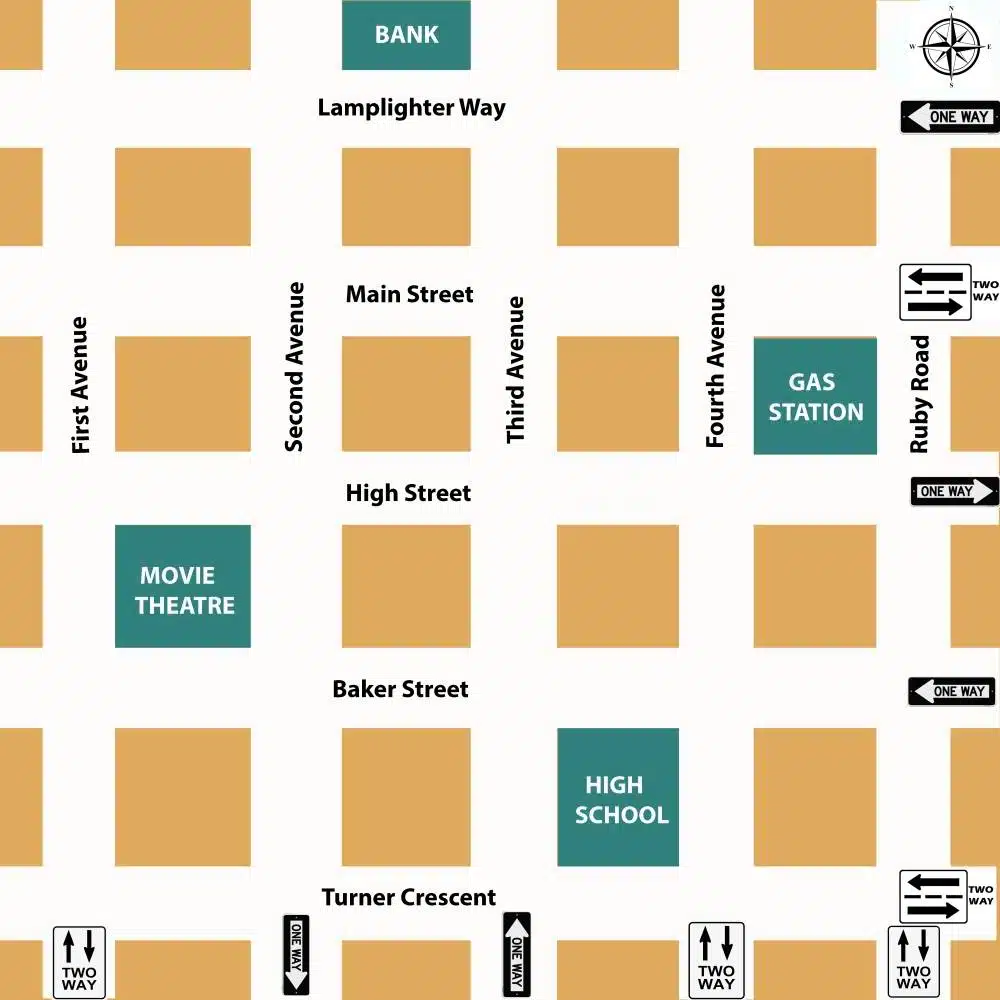
A man is standing at the intersection of High Street and Second Avenue. Which direction is the high school from his location?
- South-West
- South-East
- West
- North-West
The correct answer is B – South-East.
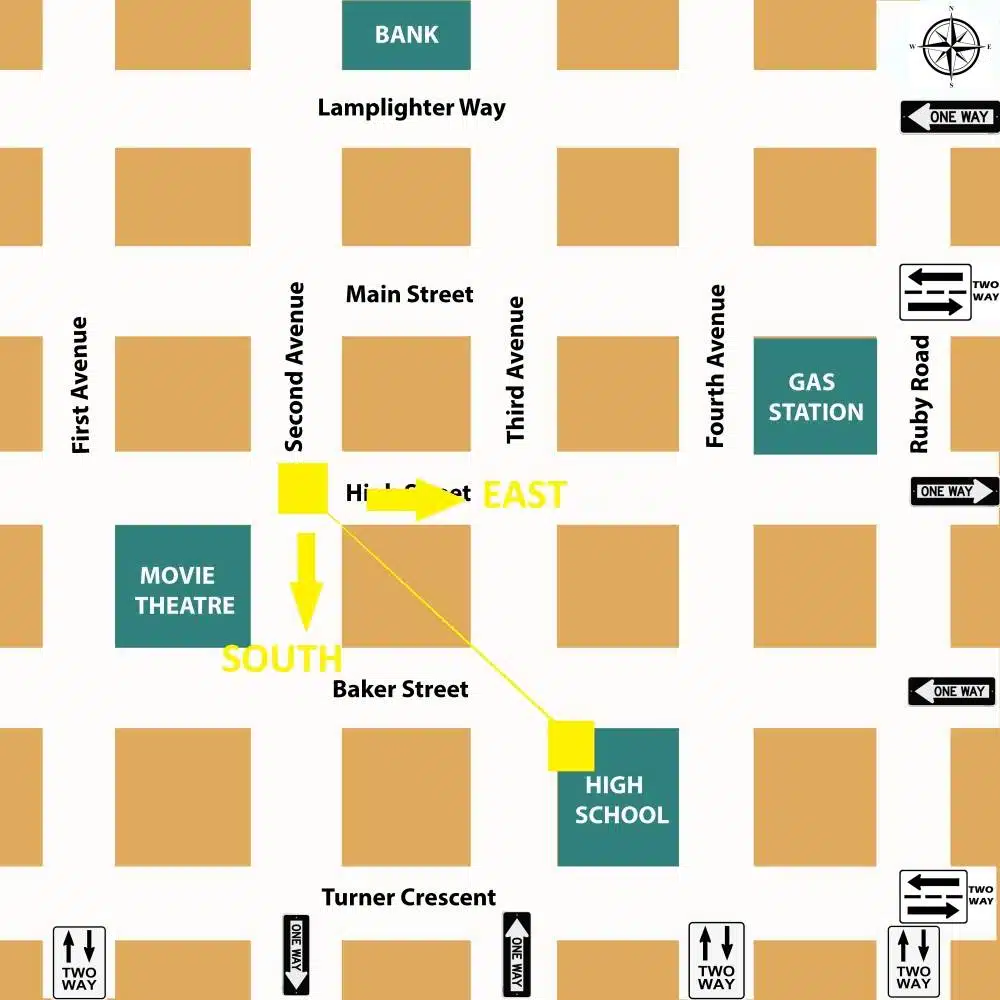
Question 4 of 10 – Memory Recall
Instructions: Listen to the audio track, memorize the sequence of letters and numbers, and fill it in only after hearing the beep.
The correct sequence was 8360KJ1.
Question 5 of 10 – Character Comparison
Instructions: Analyze the following tables. How many differences are there between Table 1 and Table 2?
| TABLE 1 | TABLE 2 |
|---|---|
| Jeffrey Morgan Jefferson | Jeffrey Morgan Jefferson |
| 28-06-1968 | 28-06-1968 |
| 689-898 Rowlands Dr | 689-898 Rowlands Rd |
| Mississippi | Mississippi |
| MI5987227111369 | MI598722711369 |
| 8986-4171-5565-4111 | 8986-4171-5565-4111 |
| 511-333-177 | 511-333-117 |
| 511-336-717 | 511-336-717 |
- 1
- 2
- 3
- 4
- 5
The correct answer is 3.
| TABLE 1 | TABLE 2 |
|---|---|
| Jeffrey Morgan Jefferson | Jeffrey Morgan Jefferson |
| 28-06-1968 | 28-06-1968 |
| 689-898 Rowlands Dr | 689-898 Rowlands Rd |
| Mississippi | Mississippi |
| MI5987227111369 | MI598722711369 |
| 8986-4171-5565-4111 | 8986-4171-5565-4111 |
| 511-333-177 | 511-333-117 |
| 511-336-717 | 511-336-717 |
Question 6 of 10 – Decision Making
Select the most appropriate agency to respond to each emergency scenario.
Teenagers have broken into a local high school. They were drinking and using illegal drugs when one teen had a seizure.

The correct answer is EMS.
While the behavior of the teenagers may prompt us to choose “Police,” the main emergency is that one teen had a seizure, which means he needs medical care.
Question 7 of 10 – Prioritization
Using the “Prioritization Rules,” choose the most appropriate priority for the given situation.
A caller reports that they can see a burglary in progress at an unoccupied house across the street.
- Priority 1: An immediate threat to life or health
- Priority 2: An immediate threat to property
- Priority 3: A routine report or incident
- Priority 4: A public service or public education
The correct answer is Priority 2.
The assailants are stealing private property. Since the crime is in progress, the threat is considered immediate.
This is based on the four levels of priority:
Priority 1: An immediate threat to life or health – Incidents that are both in-progress and threaten a person’s well-being.
Priority 2: An immediate threat to property – Incidents that are in-progress but are related to theft/damage of things. There will be no element of potential human injury in these calls.
Priority 3: A routine report or incident – Calls for service that have previously occurred. The timeline for reporting these events may span anywhere from 10 minutes to 10 days. These calls are no longer in-progress and there is some type of time-lapse.
Priority 4: A public service or public education – These are calls not related to law enforcement incidents. They will relate to public services such as visiting schools to make presentations, checking on the safety of a newly constructed traffic barrier, marching in a parade, etc.
Question 8 of 10 – Mathematics
Medical solution bags carry 500ml of fluid. Paramedics administered 4 bags of saline and 1 bag of plasma to the patient. A milliliter is equal to 3.4% of an ounce. Approximately how many ounces of saline did the patient receive?
- 5
- 68
- 85
- 2000
- 2500
The correct answer is 68.
500 ml (capacity of a bag) x 4 (number of saline bags delivered) = 2000ml fluids delivered.
A milliliter is equal to 3.4% of an ounce → 1 mm = 0.034oz
2000 x 0.034 = 2 x 1000 x 0.034 = 2 x 34 = 68oz
Notice: the information regarding the amount of plasma that the patient received was not necessary for the solution.
Question 9 of 10 – Reading Comprehension
Performing CPR on patients with a Laryngectomy or Tracheostomy can add an additional challenge. Communicators should understand the following definitions and directions.
Laryngectomy – Patients who have had a laryngectomy (the surgical removal of all or part of the larynx) have a permanent opening at the base of their neck called a stoma, which connects the airway (trachea) to the skin of the neck. Patients with a complete laryngectomy will have no airflow from the mouth and nose.
Partial Laryngectomy – In patients with a partial laryngectomy, there can be some airflow from the nose and mouth, and the chest will not rise during ventilation. The caller must cover the patient’s nose and mouth with one hand.
Tracheostomy – An artificial opening into the trachea through the neck. There can be some airflow from the nose and mouth in these patients and the chest will not rise during ventilation unless the caller covers the patient’s nose and mouth with one hand.
For all of the above, the method of ventilation is to perform direct mouth-to-stoma ventilations. Do not instruct the caller to tilt the patient’s head back. Instead, keep the head straight while delivering two breaths of air.
Which of the following CPR instructions is TRUE for patients with tracheostomies?
- Tilt the head back
- Pinch the nose closed
- Place your mouth over their mouth making a tight seal
- Breath 2 short puffs of air into their lungs
- Place a finger inside the stoma to check for blockages
The correct answer is D.
The section in the text that supports that is: “For all of the above, the method of ventilation is to perform direct mouth-to-stoma ventilations. Do not instruct the caller to tilt the patient’s head back. Instead, keep the head straight while delivering two breaths of air.”
Question 10 of 10 – Spelling
Listen to the word spoken in the sentence.
Immediately enter the word in the text field.
For optimal practice, play the audio clip only once.
First responders assessed the victims to ensure they were and breathing normally.
The complete sentence is:
First responders assessed the victims to ensure they were conscious and breathing normally.
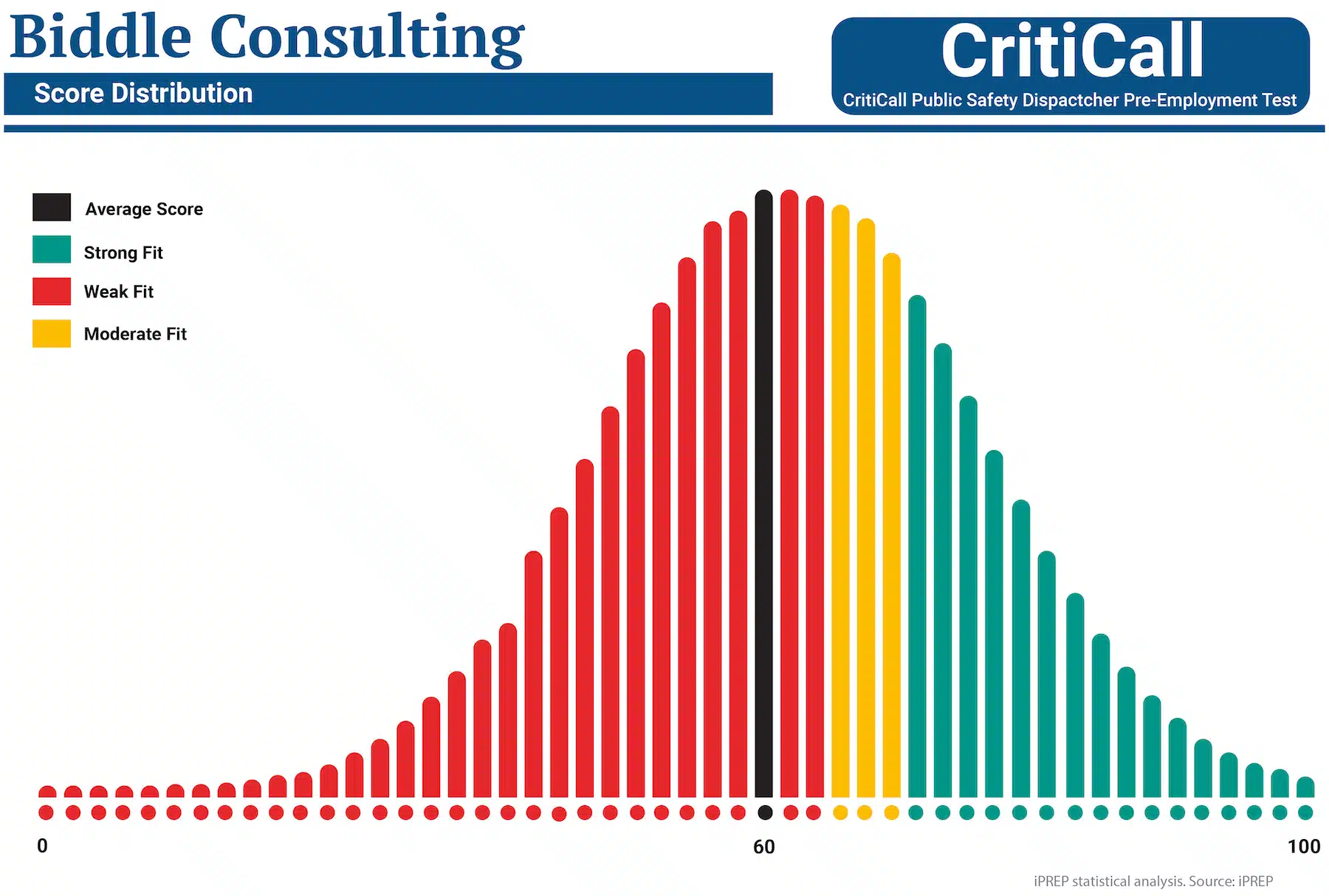
Well done!
You have completed the Sample Questions section.
The complete iPREP course includes full test simulations with detailed explanations and study guides.
‘…TESTS THAT ACTUALLY HELP’

In the first 30 minutes of use I have learned so much more than skipping along the internet looking for free content. Don’t waste you time, pay and get tests that actually help.
Richard Rodgers
January 28, 2020 at 7:49 PM
About the course
Welcome to iPrep’s 9-1-1 CritiCall test preparation course.
This course will help you boost your skills and with it your confidence towards your upcoming CritiCall test. The course will provide you with the following tools and benefits:
- You will become familiar with the test’s various types of questions.
- You will be experiencing 4 full-length CritiCall-style simulation tests. These simulations include similar questions to those you will encounter in the real test with the same level of difficulty. All the questions are followed by full solutions and explanations.
- The relevant sections of the test also have the same time limit as the real CritiCall test. Experiencing the test’s time pressure will ensure it will not come as a surprise on test day.
- You will be provided with a great variety of helpful tips for the different types of questions. Some of the tips are general in nature and tackle the general nature and features of the CritiCall test and some tips are specific for each type of question to make sure that you develop the proper solving methods for each type of question.
20
Learning hours
34
Practice tests
1212
Questions
30
Day access
By the end of this course, you will be more knowledgeable and comfortable with the CritiCall Test – Knowledge and familiarity with the test are the two most significant factors that can help you maximize your score and improve your chances of success.
The course is comprised of both practice and learning sessions. The introductory sections also include practice questions for you to get a feel for the challenge ahead. You will have the option to review your answers and question explanations.
Following the introductory sections, you will be simulating full-length tests that accurately follow the structure and concepts of the CritiCall. Once done, you will be able to get full question explanations and even see how well you performed in comparison with other people who have taken the test. You will also be able to take the tests in practice mode without any time limit to enable a self-paced progression of the simulation.
Wishing you an enjoyable learning experience!
What you will gain from this course
Understand the CritiCall test structure
Master each question type
Develop speed and accuracy
Curriculum
- Course Introduction
- Test Overview & Test Tips
- Question Types Introduction
- Full-Length CritiCall-Style Simulation Tests
- Course Conclusion
About the author

Melissa Taaffe
Emergency Number Professional
Melissa Taaffe is a college professor and author of pre-employment testing materials. She has worked as a 9-1-1 communicator and supervisor in 3 different communications centers and is currently a certified instructor for the Association of Public-Safety Telecommunicators (APCO) and the Office of the Fire Marshal and Emergency Management (OFMEM).
Through hard work and experience, Melissa has been designated an Emergency Number Professional, an accreditation earned through the National Emergency Number Association (NENA). Melissa is also a chief contributor to “911-operator” and is the owner of “911Professor”. When she’s not working or playing with her kids, you can find her mountain biking or drinking craft beer at a rock concert.
Customer Testimonial

I fell 45 pts. short of passing the official CritiCall on my first try. I was allowed to redo the modules on which I did poorly. I focused just on those modules in my dashboard to solidify those skills and went on to pass on my 2nd attempt. I honestly don’t think I would have passed without iPrep. While there are some online sites you can go to for practice, none of the ones I found were anywhere near as comprehensive as iPrep. After taking the test, I was talking with the testing administrator about iPrep. She was not familiar with it, so I pulled it up and showed her the dashboard. She said something along the lines of This is great! I should show this to our trainer. She was very impressed. I recommend this program with no hesitation whatsoever.
Sandra Patel
June 18, 2022 at 4:36 AM
Reviews

suzette d*********
July 5, 2025 at 6:43 PM
This is helping me so much. I don’t know what I would have done without it. Thank you so much, iPREP!

Flor A******
June 13, 2025 at 3:33 PM
Great Resource – Helped Me Score 85% on My First Try! IPrep was exactly what I needed to prepare effectively and confidently. The material was clear, well-organized, and focused on the key concepts I needed to know. I felt supported every step of the way, and the practice tests were incredibly helpful in building my confidence.

Brian P****
June 13, 2025 at 2:43 PM
Expertly put together, the course and content is just what I needed! The drumbeat temp used to mimic the duties helped improve my understanding of the impending test. Practice content is designed perfectly and I identified my weaknesses early!

Chathumini W*********
May 15, 2025 at 10:50 PM
Today I did critical test, But I could notice, it was totally different from what I did in Critical Test Prep course in IPREP. I am so disappointed. I these activities should be updated according 2025 standards. I am not happy happy about this course. Never recommend this to someone else. This is totally waste of money

iPrep
May 16, 2025 at 7:24 PM
Hi Samanthika, We're sorry to hear the course didn’t meet your expectations. While our prep does highlight key differences—like the real test’s pop-up format—we understand it can still feel quite different under pressure. We’ve already issued you a full refund and are using your feedback to improve clarity for future learners. Wishing you all the best ahead.

Stacey B****
May 15, 2025 at 2:32 PM
I'm feeling more prepared to take the test. I wish there were more practice tests included as you can never have too many.

Bonnie F*****
May 10, 2025 at 10:28 PM
So far i am 1/2 way thru practice Iprep and thank heavens I did this. I will help me for sure.

Kristina W****
May 8, 2025 at 8:41 PM
So glad something was out there to help me prepare so quickly! Gave me the confidence to take the test and do well at that. Definitely recommend to help you prepare and ease your nerves.

Valerie S*****
May 6, 2025 at 8:00 PM
iPrep helped me take the CritiCal test. Previously, I was slow with my timing, unsure about the formats required, and lost overall. iPrep sharpened my skills with the course and boosted my confidence when I saw how well I was doing with the practice simulations. I definitely recommend anyone who is going to take the CritiCal test to take the iPrep course first.

Hannah A*******
April 28, 2025 at 11:28 AM
I passed the test. The proctor even said I did better than the average person! Very thankful I was so prepared with this course!
